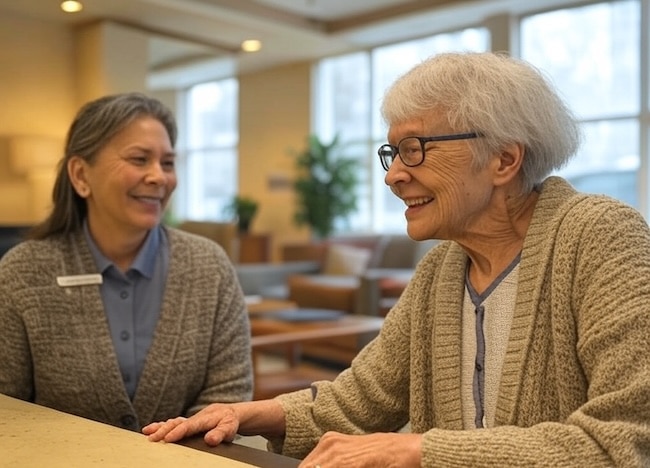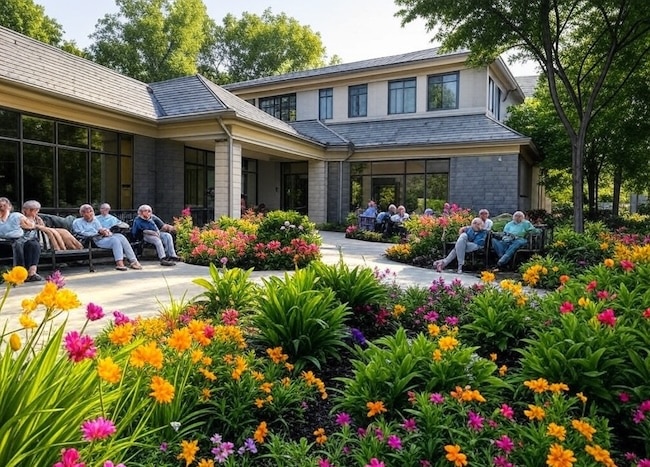Here's an excellent overview of the seven most common senior housing options. This piece may help you hone in on the right housing choices for your loved one based on care needs and budget. We'll explain each option, who would benefit from it, and how much it typically costs.

Seven Senior Housing Options to Consider
When it’s time to make a change in your loved one's living situation, choosing from the available senior housing options might feel overwhelming.
Options range from aging in place (at home) to full-time care in a nursing home.
Looking at the basics may help you narrow the list to make the right choice for your family.
First, think about how much help your loved one needs each day. Next, think about what they’re able to afford.
Here's an excellent overview of the seven most common senior housing options, helping you focus on the types of housing that will most likely suit your loved one's care needs and budget.
We explain each type of housing, who would benefit from it, how it works, and the relative cost.
1. Aging In Place
- What is it? When an older adult lives in their own home or with family.
- Who is it suitable for? If your loved one is still relatively independent or can pay for in-home care help, staying at home as long as possible may be a good option.
- How does it work? In-home caregivers, cleaning, meal delivery, and other services can help with activities of daily living (ADL's). Simple home repairs or modifications, such as installing a wheelchair ramp, bathroom grab bars, or a medical alert system, can make homes safer.
- Relative cost? Low to medium, but can require more help from family caregivers and friends.
2. The Village Concept (Senior Co-housing)
- What is it? This model links neighbors and local businesses to help seniors stay in their homes as they age.
- Who is it suitable for? Older adults who want help similar to what they would receive at a retirement community, but don’t want to leave their homes.
- How does it work? Villages usually don’t provide services directly, but act as a liaison or concierge service. Actual help comes from other able-bodied village members, younger neighbors, or youth groups doing community service.
- Relative cost? Low. Village members pay an annual fee (average is about $600) for services such as transportation, yard work, and bookkeeping.
- More info: Find out how a Village works.
3. Independent Living
- What is it? Any housing designed exclusively for seniors, usually including apartment-style retirement communities, retirement homes, senior housing, and senior apartments.
- Who is it suitable for? Older adults who want to live in an active community setting, free from worries about daily chores like house maintenance, cooking, or housekeeping.
- How does it work? They’re a little like mini-college campuses, where people of similar age live together in a community that provides opportunities for socialization. The housing is generally more compact, easier to navigate, and includes help with outdoor maintenance.
- Relative cost? Medium to high. Depending on location and services, monthly costs can range from $1,500 to $10,000.
4. Residential Care Homes (aka Adult Care Homes)
- What is it? Small facilities or residential homes that offer personalized service to small groups of adults. They’re also known as adult family homes, board and care homes, or personal care homes.
- Who is it suitable for? Someone who needs more personalized individual care in a home-like setting.
- How does it work? Adult Care Homes provide lodging, meal services, and assistance with activities of daily living (ADL's).
- Relative cost? Medium. They can often be half the cost of nursing homes and, in some states, are more affordable than assisted living communities.
- More info: Learn more about the types of care provided in residential care homes, average costs, and who might like this type of setting.
5. Continuing Care Retirement Community (CCRC)
- What is it? Continuing care retirement communities are part independent living, part assisted living, and part intermediate care facility and/or skilled nursing facility.
- Who is it suitable for? Older adults who want to live in one location for the rest of their lives don’t want to worry about arranging for future care needs. They’re also suitable for spouses who wish to stay close to one another even if one requires a higher level of care.
- How does it work? Residents can start living in the independent living section and move to different parts of the same community as they need increasing levels of care.
- Relative cost? High. CCRCs are the most expensive of all long-term-care options. There’s likely a significant entrance fee and monthly fees that increase as higher levels of care are needed.

6. Assisted Living Community
- What is it? An assisted living community typically consists of small apartments in a senior care community. There’s a wide range of services across different facilities.
- Who is it suitable for? Older adults who can live somewhat independently but also may require some assistance. Some communities do offer higher levels of care.
- How does it work? Typical services include staff available 24 hours a day, meals, medication management, bathing, dressing, housekeeping, and transportation. Most facilities have a group dining area and common areas for social and recreational activities.
- Relative cost? High. Costs vary according to the daily care required and the type/size of living space.
- More info: A social worker shares advice on how to decide if a move is necessary; understand the “fine print” details before signing any contracts.
7. Nursing Home or Skilled Nursing Facility
- What is it? This option is for older adults who need 24-hour supervised care with meals, activities, and health management.
- Who is it suitable for? Older adults with severe or debilitating physical or mental illnesses who are unable to care for themselves.
- How does it work? A licensed physician supervises each resident’s care, and a nurse or other medical professional is almost always on-site. Some facilities have physical and occupational therapists on staff, and others have special services for Alzheimer's or dementia memory care.
- Relative cost? High. Costs vary according to the daily help required and the type of living space.
- More info: If problems arise in the nursing facility, the local ombudsman is on your side.
Recommended for you:
- When to Move to Assisted Living? Advice From a Social Worker
- How to Pay for Assisted Living: 6 Options
- 3 Tips to Choose Between Assisted Living vs In-Home Care
About the Author

Connie Chow
Connie was a hands-on caregiver for her grandmother for 20 years. (Grandma made it to 101 years old!) She knows how challenging, overwhelming, and all-consuming caring for an older adult can be. She also knows how important support is — especially in the form of practical solutions, valuable resources, and self-care tips.





We would like suggestions on what to do! We have a 102 year old father who was a military vet who needs help. His two children, one who has leukemia and in and out of the hospital and one who works for the postal service and does not have the ability to provide 24/7 care. We have asked family and friends to help along with 2 grandchildren; however, as everyone knows, it is impossible for someone to live with him on a long term basis. He gets around ok, not bed ridden, he can’t hear and his site is failing so he can’t read the messages we write anymore but his appetite is good. Any suggestions for help?
It sounds like an option to explore is to move to assisted living (see above for an overview). We’ve also got an article about veterans benefits that might be helpful – https://dailycaring.com/the-ultimate-guide-to-senior-veterans-benefits/
very helpful. I live on the westside of LA and would like to find an active senior community in this area. any suggestions welcome. thank you.
We aren’t able to make specific recommendations, but suggest that you try searching online in your area for “senior living los angeles” or “independent senior living west los angeles”
Thanks for sharing. This is very informative. A few years ago we were looking for a senior housing san diego community for dad and so glad we found [redacted for privacy]. He has now been there since 2018 and I have never seen him happier since mom passed. It’s a wonderful place with great staff and our family couldn’t be more thankful. The environment and surroundings are great, the whole place is very clean and the care that the residents are receiving from what I could see is very nice. Thank you [redacted for privacy]
We’re so glad that you found a wonderful senior housing community that your dad enjoys!
I am a 62 year old homeless women. Currently I am staying with my daughter . I have bad credit and an emotional support dog. I hope you can help me or suggest who can
It’s great that you’re able to stay with your daughter for now.
For a longer-term housing solution, your local Area Agency on Aging may also be able to connect you to organizations that can help. More info here – Area Agency on Aging: Resources for Seniors https://dailycaring.com/area-agency-on-aging-resources-for-seniors/
Thanks
You’re very welcome!
This is a very nice explanation about the senior housing options. Thanks a lot for sharing…
Thanks for the kind feedback! We’re so glad this is helpful.
I Love this site
Thank you so much! We’re so glad our articles are helpful!